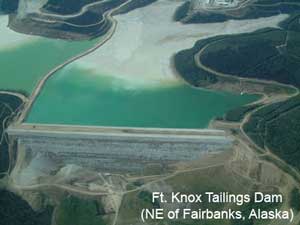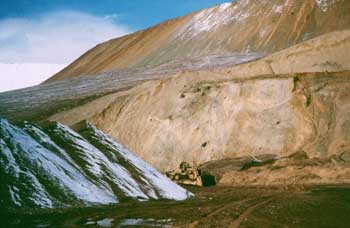Waste Disposal at the Pebble Mine
 Amount and type of waste Amount and type of waste
Mine Tailings
“The processing of ore promotes the dissolution and mobilization of elements present in the ore…Consequently, tailings undergo chemical reactions after their deposition in the repository and their composition changes over time.”1
Tailings are one form of waste generated from mining. When mined. low grade porphery deposits, like the proposed Pebble prospect, will generate large volumes of waste2. For example, processing 10 billion tons of ore can produce up to 9.9 billion tons of tailings. Mine tailings contain solids and liquids, metals, and processing chemicals. The solids are primarily clay, silt and sand. Some mined minerals and associated elements will occur in tailings, such as: aluminum, antimony, arsenic, barium, cadmium, copper, chromium, cobalt, iron, lead, manganese, mercury, molybdenum, nickel, selenium, silver, thallium, zinc, sulfides, and natural radioactive constituents. The composition of tailings depends on ore composition and processing chemicals used.
 Tailing liquids will contain some processing chemicals (e.g., Cyanide, Xanthates, etc.) and petroleum products (e.g., diesel, oil, gas, etc.)3. Tailings that contain reactive sulfides- which are present in the Pebble deposit, - can generate sulfuric acid if exposed to both air and water; thus they are often stored under water4. Both solid and liquid components of mine tailings can be toxic and impair natural ecosystem function if not contained properly. Tailing liquids will contain some processing chemicals (e.g., Cyanide, Xanthates, etc.) and petroleum products (e.g., diesel, oil, gas, etc.)3. Tailings that contain reactive sulfides- which are present in the Pebble deposit, - can generate sulfuric acid if exposed to both air and water; thus they are often stored under water4. Both solid and liquid components of mine tailings can be toxic and impair natural ecosystem function if not contained properly.
1 Lotterman, BG. 2007. Mine Wastes, Second Edition, characterization, treatment, environmental impacts. Page 154.
2 Lotterman, BG. 2007. Mine Wastes, Second Edition, characterization, treatment, environmental impacts. Pages 152-157.
Waste Rock
Further Reading and References
Pebble Limited Partnership References
Backgrounder - Tailings and Tailings Management (pdf file 1.96 mb)
Backgrounder - Assessing and Managing Seismic Risk (pdf file 2.18 mb)
Independent Scientists References
Byrne, P. M. and M. Seid-Karbasi. 2003. Seismic Stability of Impoundments. 17th Annual Symposium, Vancouver Geotechnical Society. (pdf file 538 kb)
Coleman, T. W. and A. Perales. 1998. Boliden Apirsa, Los Frailes Tailings Incident - Technical Report. Mining and Environment Research Network. University of Bath, United Kingdom. (pdf file 408 kb)
Davies, M. P. 2002. Tailings Impoundment Failures: Are Geotechnical Engineers Listening? Waste Geotechnics. Geotechnical News. 31-36. (pdf file 157 kb)
Haeussler, P. J. and R. W. Saltus. 2004. 26 km of Offset on the Lake Clark Fault Since Late Eocene Time. Stuides by the U.S. Geological Survey. USGS Professional Paper 1709-A. (pdf file 1.35 mb)
Kroll, A. M., G. Betlem, and J. M. Amezaga. 2002. Mine Water Pollution and European Policies. (pdf file 52 kb)
Martin, T. E., M. P. Davies, T. Higgs, and P. C. Lighthall. 2002. Stewardship of Tailings Facilities. AMEC Earth and Environmental Limited. (pdf file 1.15 mb)
Peplow, D. and R. Edmonds. 2005. The effects of mine waste contamination at multiple levels of biological organization. Ecological Engineering 24(2005)101-119. (pdf file 548 kb)
Rico, M., G. Benito, A. R. Salgueiro, A. Diez-Herrero, and H. G. Pereira. 2008. Reported Tailings Dam Failures: A Review of the European Incidents in the Worldwide Context. Journal of Hazardous Materials. 152(2008)846-852. (pdf file 504 kb)
Rudolph, T. and W. G. Coldewey. Implications of Earthquakes on the Stability of Tailings Dams. International Mine Water Association. (pdf file 227 kb)
Schwartz, N. 2008. Desert wind blows health risks from California mines. Associated Press. Sunday, December 21, 2008. (pdf file 14 kb)

|
